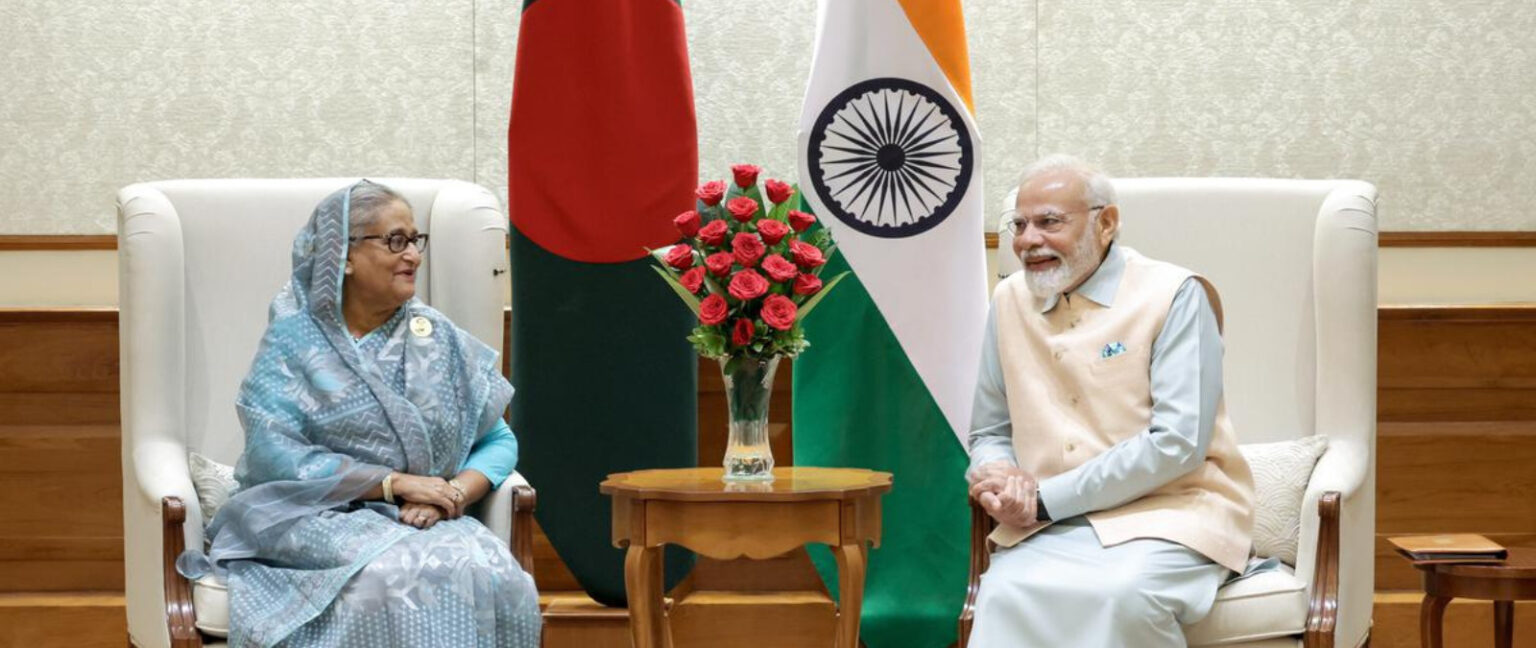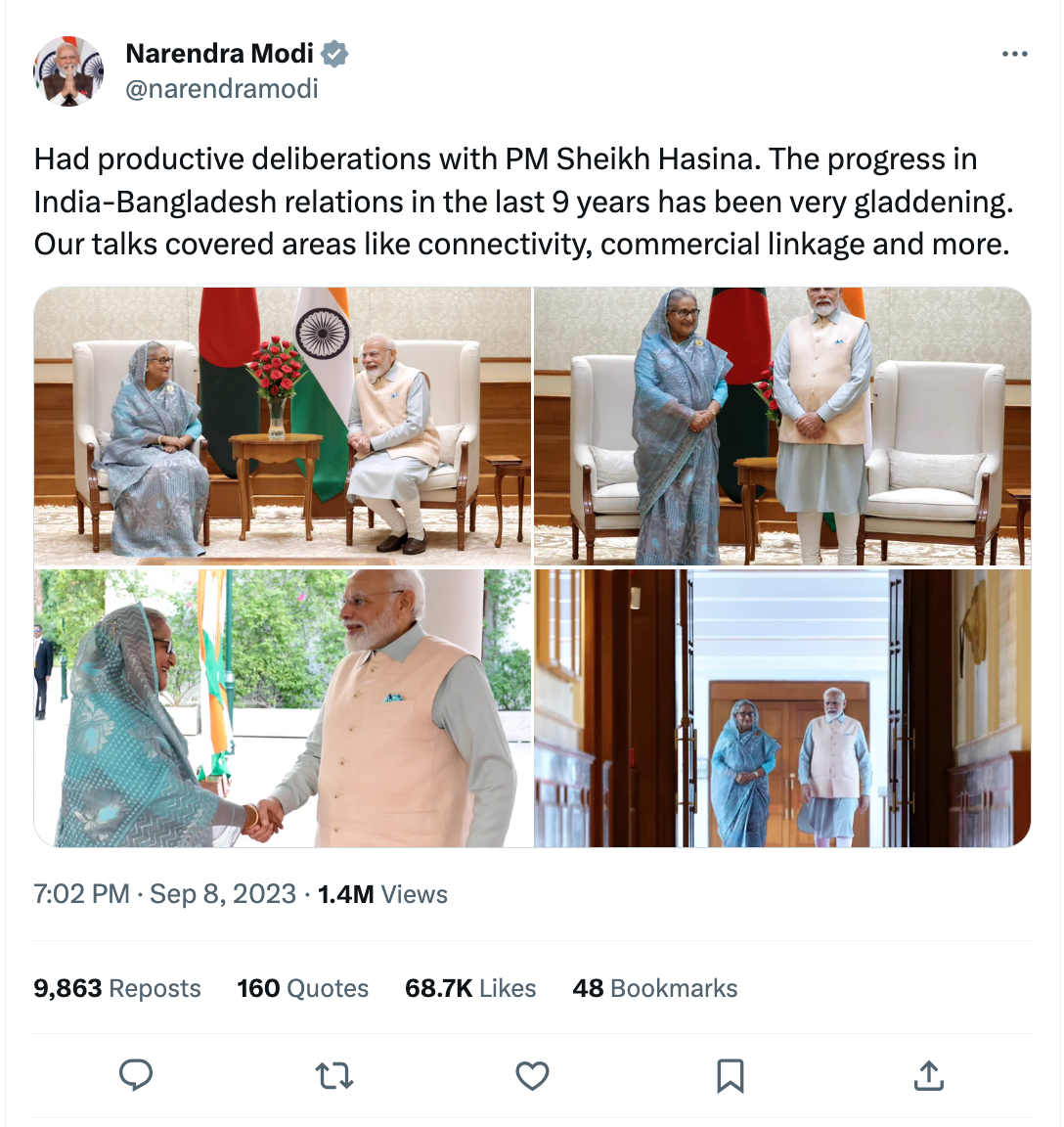During their Friday bilateral meeting in New Delhi, Prime Minister Narendra Modi and counterpart Sheikh Hasina of Bangladesh also signed three memorandums of understanding (MoUs), including one on collaboration in digital payment mechanisms.
Friday afternoon saw Hasina’s arrival in New Delhi for the G20 Summit as a guest. The two Premiers met outside of the summit for more than an hour and a half, including around 30 minutes of one-on-one time.
Bangladesh: The Teesta dispute
The Teesta dispute, which has been unresolved since 2011 because of Mamata Banerjee, the chief minister of Bengal, has previously been mentioned as a topic of discussion by the Bangladeshi side.
Hasina will benefit from the fact that Modi addressed the need to address the outstanding issues at the official level since it will demonstrate to her supporters that she raised the matter with her Indian counterpart. Hasina will be running for office in a general election in three to four months. But it’s still unclear whether the problem can be handled through official-level dialogue.
Teesta will still be a topic of conversation on Saturday due to the likelihood that Hasina will meet Mamata at the G20 official dinner that is being hosted by President Droupadi Murmu. “Although one cannot have any structured discussion during a dinner, you can’t rule out the possibility of our PM talking about Teesta with the Bengal chief minister…. Let’s see what happens,” a Bangladeshi source remarked.
From the Indian side, there was no official word about the bilateral meeting, but Modi’s post on his official X (previously Twitter) feed encouraged the Bangladeshi side.
Image source: PM Modi Twitter account
Agreements between PM Modi and Sheikh Hasina
According to a statement from the Ministry of External Affairs, National Payments Corporation of India (NPCI) and Bangladesh Bank signed an agreement on cooperation in digital payment mechanisms.
The renewal of the Cultural Exchange Program (CEP) between India and Bangladesh for the year 2024–2025 was the subject of another MoU. The Bangladesh Agriculture Research Council (BARC) and the Indian Council of Agricultural Research (ICAR) have signed the third Memorandum of Understanding (MoU).
According to the MEA announcement, PM Modi and Sheikh Hasina were eager to start talks on the Comprehensive Economic Partnership Agreement (CEPA), which would include trade in products and services as well as safeguard and promote investment.
The two presidents covered the complete spectrum of bilateral cooperation, including border control, commerce and connectivity, water resources, power and energy, development cooperation, and cultural and people-to-people ties.
Additionally discussed topics were cooperation in international fora and recent regional developments.
Both Prime Minister Modi and his Bangladeshi counterpart Sheikh Hasina expressed satisfaction with the execution of development cooperation projects and expressed anticipation for the joint inauguration of the Agartala-Akhaura Rail Link, Unit-II of the Maitri Power Plant, and Khulna-Mongla Rail Link projects at a more convenient time in the future.
Refugees from Myanmar’s Rakhine State in Bangladesh
In light of Bangladesh’s location in the region, PM Modi extended gratitude to the nation for bearing the burden of housing more than a million refugees from Myanmar’s Rakhine State.
According to the MEA, he expressed India’s constructive and upbeat stance to supporting solutions for the refugees’ safe and long-term return.
Prime Minister Modi was thanked for his hospitality by Bangladeshi Prime Minister Sheikh Hasina, and the two leaders expressed a willingness to maintain their interactions at all levels. The leaders made the decision to continue working together in order to increase their extensive engagement.
Bangladeshi Foreign Minister’s exclusive interview with India Today
Bangladesh’s Foreign Minister, AK Abdul Momen, stated that India and Bangladesh relations are at their best in an exclusive interview with India Today. He also thanked India for inviting Bangladesh to the G20 summit. He claimed that there is a big chance to speak up for South Asian interests on the G2O’s global stage.
By way of its digital public infrastructure, India has demonstrated a commitment to diversity, and Momen lauded this as well as the strong historical and cultural ties that bind India and Bangladesh. For nations like Bangladesh, he claimed, the problem of climate change is essential, and “we are glad that India is ensuring its seriousness.”














